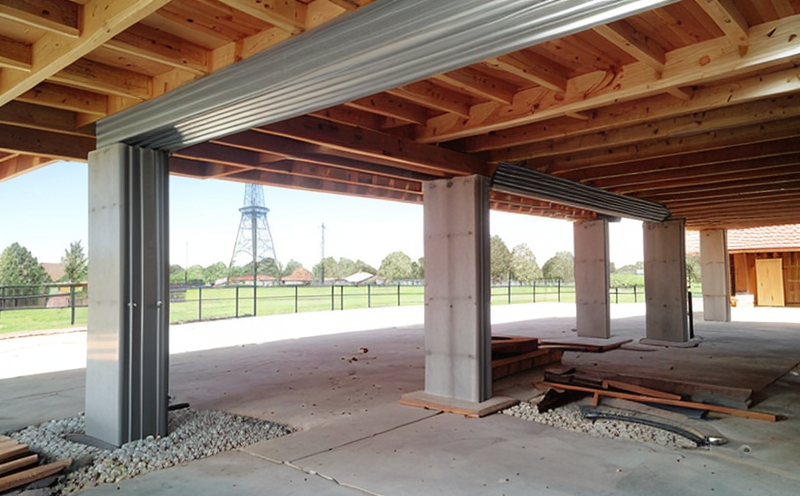Ensuring that structural elements, such as beams and slabs, maintain their integrity when subjected to bending forces
Ensuring Structural Integrity Why Bending Forces Shouldnt Be a Concern for Your Business
As the backbone of modern construction, structural elements such as beams and slabs play a critical role in ensuring the stability and safety of buildings, bridges, and other infrastructure. However, when subjected to bending forces, these essential components can be put under immense stress, compromising their integrity and potentially leading to catastrophic failures.
At Eurolab, we understand the importance of maintaining structural integrity, especially in high-traffic areas or regions prone to extreme weather conditions. Our laboratory services are designed to help businesses ensure that their beams and slabs can withstand bending forces without sustaining damage or failing prematurely.
The Importance of Ensuring Structural Integrity
In todays construction landscape, ensuring the structural integrity of buildings is more crucial than ever. With increasingly complex designs, innovative materials, and evolving environmental conditions, engineers and builders must be confident in the performance of their creations.
A single failure can have devastating consequences
Loss of life or injury to occupants
Extensive property damage
Environmental hazards (e.g., structural collapse into waterways)
Financial ruin due to costly repairs or rebuilding
By employing Eurolabs services, businesses can mitigate these risks and ensure the longevity and safety of their structures.
Benefits of Ensuring Structural Integrity
Our laboratory services are tailored to help you
Advantages of Using Our Laboratory Services
Here are just a few reasons why our comprehensive testing solutions are essential for your business
Prevent structural failures Identify potential weaknesses before they become catastrophic issues.
Reduce costs Avoid costly repairs, rebuilds, or even lawsuits due to avoidable structural damage.
Boost public confidence Demonstrate a commitment to safety and quality, enhancing reputation and trust among stakeholders.
Comply with regulations Meet industry standards and regulatory requirements for structural integrity testing.
Increase asset lifespan Prolong the useful life of your structures through informed maintenance and repair strategies.
Enhance engineering designs Collaborate with our experts to optimize beam and slab configurations, ensuring maximum performance.
What Does Our Laboratory Service Entail?
Our comprehensive laboratory service includes
Sampling and preparation We collect and prepare representative samples from your beams and slabs for testing.
Testing protocols Our team develops customized testing plans according to specific material properties, geometry, or environmental conditions.
Analysis and interpretation Using state-of-the-art equipment and methodologies, we analyze the test results, providing actionable insights into structural behavior under bending forces.
Reporting and recommendations Based on our findings, we provide clear, concise reports outlining necessary modifications, repairs, or design enhancements to ensure structural integrity.
Frequently Asked Questions
Q What types of materials can be tested using Eurolabs laboratory services?
A We offer comprehensive testing for a wide range of materials, including but not limited to concrete, steel, wood, and composite structures.
Q How long does the laboratory service process typically take?
A The duration of our laboratory service varies depending on the complexity of your project. However, we strive to complete all phases within 4-6 weeks.
Q What is the average cost of Eurolabs laboratory services?
A Our pricing structure is based on a per-project basis. Well provide you with a detailed estimate after discussing your specific needs and requirements.
Conclusion
At Eurolab, we understand that ensuring structural integrity is paramount to safeguarding people, property, and the environment. By collaborating with our expert team, businesses can rest assured that their beams and slabs are capable of withstanding bending forces without compromising their integrity.
Dont wait until its too late prioritize your businesss safety and longevity today. Contact us for more information on how to schedule a comprehensive laboratory service tailored specifically to your needs.
-
Testing the ability of materials to withstand bending forces without breaking
-
Simulating the effects of bending and flexing on construction materials under load
-
Evaluating the resistance of materials to deformation and failure when subjected to flexural stress
-
Testing for the maximum bending load that materials like concrete, metal, and composites can withstand
-
Simulating conditions in which materials will bend under load and testing for any cracks or fractures
-
Verifying the suitability of materials used for structural support in bending applications
-
Ensuring that materials used in walls, floors, and ceilings maintain their strength under bending stress
-
Testing how materials react when subjected to bending in different environmental conditions, such as heat or moisture
-
Simulating the bending behavior of materials used in high-stress applications like bridges and highways
-
Evaluating the performance of materials used for flooring and roofing under bending conditions
-
Testing the flexural strength of materials used for insulation and soundproofing in construction
-
Verifying that the flexibility of materials like plastics and composites does not affect their overall strength
-
Simulating scenarios where bending forces are applied repeatedly to determine long-term durability
-
Testing how the shape and design of a material influence its resistance to bending or flexural forces
-
Ensuring that materials in construction retain their structural properties under bending stress over time
-
Verifying the strength and reliability of materials used in lightweight and modular construction
-
Testing for the ability of materials to return to their original shape after being bent (elasticity)
-
Evaluating materials for flexibility without compromising structural integrity or safety
-
Testing for bending failure, including cracking, warping, or twisting, under excessive load
-
Ensuring that building materials can resist bending deformation caused by shifting or settling foundations
-
Simulating real-world bending conditions, such as bending from wind or seismic forces, to test material resilience
-
Testing for the ability of materials to support heavy loads without losing their shape or structural performance




